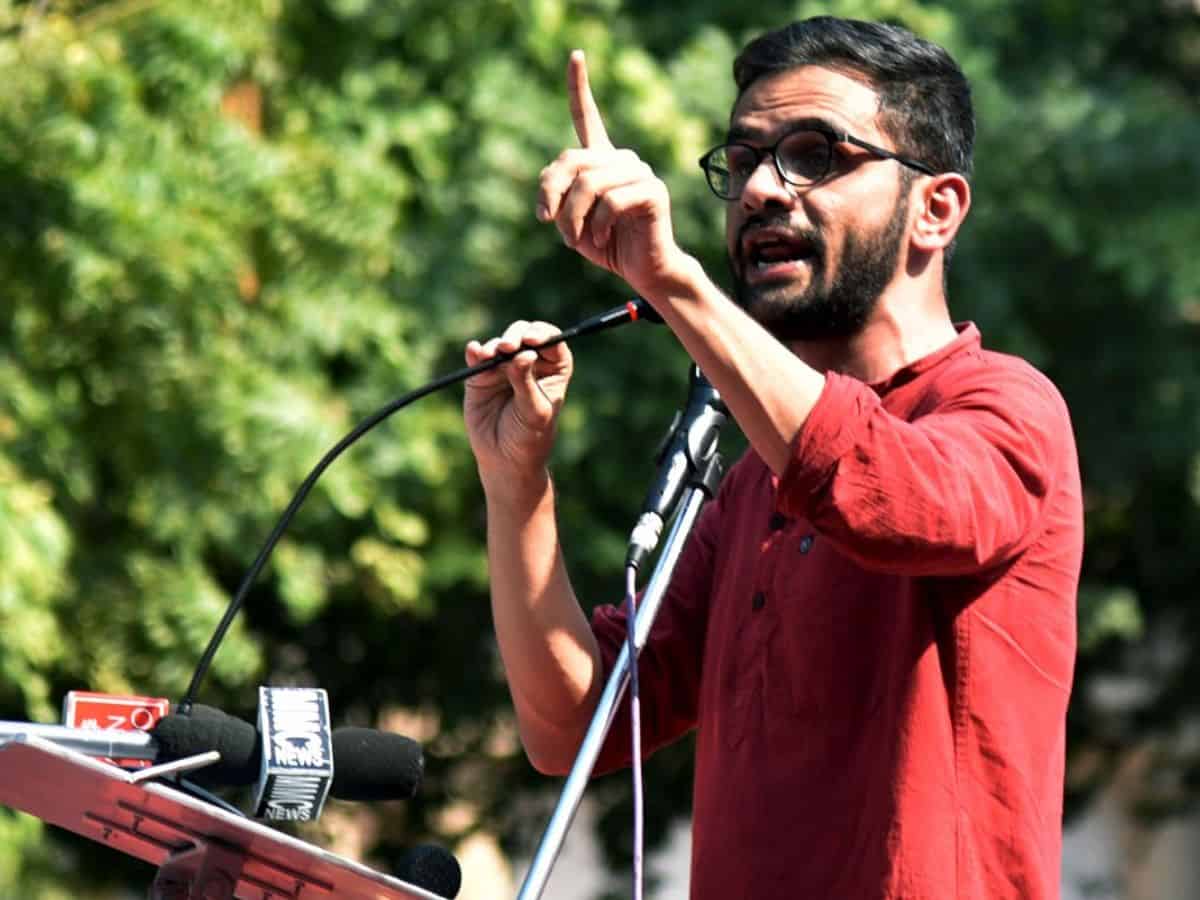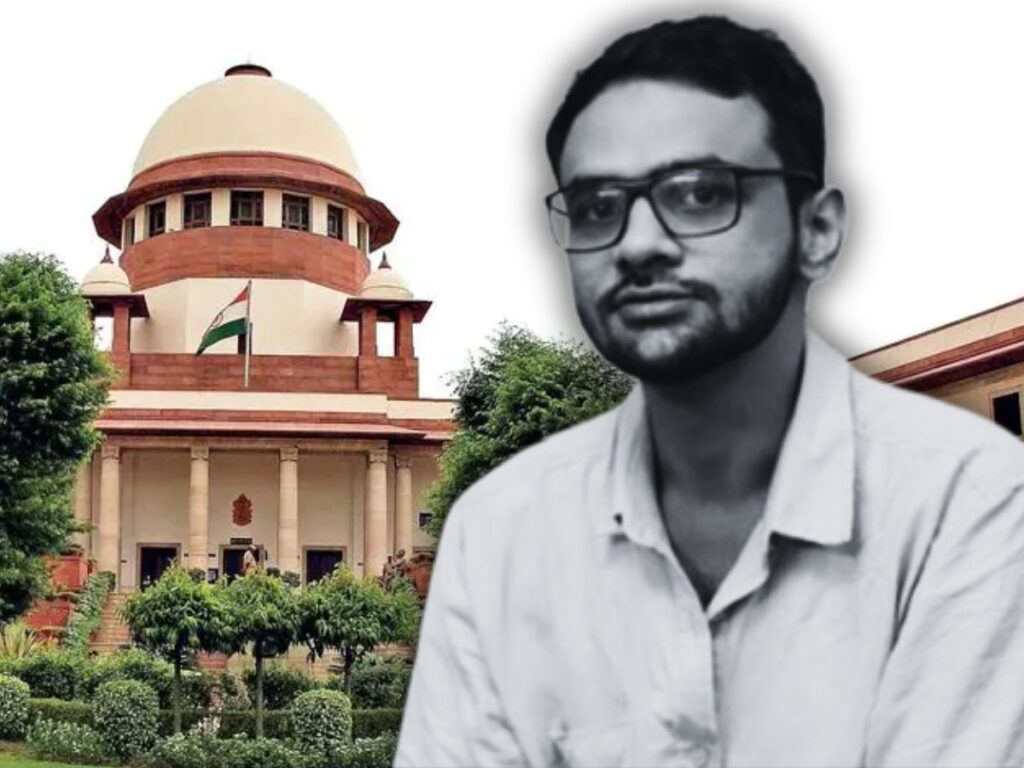
The bail petitions of Jawahar Lal Nehru (JNU) student Umar Khalid and others, who have been accused under the Unlawful Activities (Prevention) Act, (UAPA) have been postponed once again. The next day of hearing is November 25.
Umar Khalid was arrested on September 13, 2020 under UAPA in an alleged conspiracy case related to the North–East Delhi riots.
The matter was adjourned as the division bench comprising Justice Navin Chawla and Justice Shalinder Kaur did not sit today. Now, the petitions will be heard in the last week of November.
Umar Khalid, along with Shifa ur-Rehman, Sharjeel Imam, Natasha Narwal, Meeran Haider, Khalid Saifi, Ishrat Jehan, Gulfisha Fatima, Devangana Kalita, Safoora Zargar, Asif Iqbal Tanha are detained for protesting “religious freedom conditions.”9

The executive accuses them of inciting communal violence through speeches in February 2020, which resulted in riots killing 53 people. The majority of them belong to Muslim community. However, the student activists deny the allegations levelled against them and call, “peaceful protests opposing the religious discriminatory Citizen Amendment Act (CAA).”
Charges against Umar Khalid
Then 32-year-old student leader Umar Khalid was charged under FIR 59/2020 with offenses under the IPC, 1967 Arms Act, and Unlawful Activities (Prevention) Act (UAPA). Charges include but are not limited to rioting (Sec. 147 IPC), rioting with a deadly weapon (Sec. 148 IPC), murder (Sec. 302 IPC), attempted murder (Sec. 307 IPC), sedition (Sec. 124A IPC), “promoting enmity between different groups on grounds of religion, race, place of birth, residence, language, etc., and doing acts prejudicial to maintenance of harmony” (Sec. 153A IPC), unlawful activities (Sec. 13 UAPA), terrorist acts (Sec. 16 UAPA), raising funds for terrorist acts (Sec. 17 UAPA), and conspiracy (Sec. 18 UAPA).
Umar Khalid was charged under FIR 59/2020 with offenses under the IPC, 1967 Arms Act, and Unlawful Activities (Prevention) Act (UAPA). Charges include but are not limited to rioting (Sec. 147 IPC), rioting with a deadly weapon (Sec. 148 IPC), murder (Sec. 302 IPC), attempted murder (Sec. 307 IPC), sedition (Sec. 124A IPC), “promoting enmity between different groups on grounds of religion, race, place of birth, residence, language, etc., and doing acts prejudicial to maintenance of harmony” (Sec. 153A IPC), unlawful activities (Sec. 13 UAPA), terrorist acts (Sec. 16 UAPA), raising funds for terrorist acts (Sec. 17 UAPA), and conspiracy (Sec. 18 UAPA).
Umar Khalid bail petitions
On April 15, 2021, the Delhi court granted Khalid bail. However, he was forced to remain in Tihar prison in light of other charges slapped against him. In December 2022, the same Delhi Court granted temporary bail to Khalid to attend his sister’s wedding from December 23 to December 30. After this temporary reprieve, Umar Khalid’s bail petitions have been subjected to recusals, rejections and adjournments.
UAPA Law
Section 43D (5) in The Unlawful Activities (Prevention) Act, 1967 makes it difficult to obtain bail: “Notwithstanding anything contained in the Code, no person accused of an offence punishable under Chapters IV and VI of this Act shall, if in custody, be released on bail or on his own bond unless the Public Prosecutor has been given an opportunity of being heard on the application for such release. Provided that such accused person shall not be released on bail or on his own bond if the Court, on a perusal of the case diary or the report made under section 173 of the Code is of the opinion that there are reasonable grounds for believing that the accusation against such person is prima facie true.”
Agreed! The provision of ‘prima facie true’ the law makes immediate bail difficult. The provisions also determine the investigation period can be extended to a maximum of 180 days with prior approval of the judiciary. But Umar Khalid has spent around four years in jail. In Union of India v KA Najeeb (Jan 2021), the Supreme Court upheld the grant of bail under UAPA when the accused had undergone incarceration for a significant period. However, it recognised that bail under UAPA was an exception
Bail is a rule
Time and again it has been advocated that, ‘bail is a rule and jail is an exception’ by no less than the Chief Justice of India. Then, why are the cases reaching the apex court for grant of bail?
This raises several questions: Why are the lower courts not inclined to take risks in granting bail to the accused? Aren’t recusals delaying the process? Former Central Information Commissioner and Dean, School of Law, Mahindra University, Prof. Madabushi Sridhar Acharyulu says, “The main issue is the judicial decisions. It does not mean, the courts are to be blamed. Judicial delay is mostly because of wrong and deliberate criminal acts of the Executive based on totally communal reasons.”
Unreasonable delay
There is an unreasonable delay in the investigation. The appellants argue that the accused have completed nearly four years in Tihar Jail ‘without any progress in the investigation.’ The prosecution, however, argues that there was sufficient material linking them to the conspiracy.
Considering that the prosecution has gathered sufficient evidence against Umar Khalid and his associates, what is stopping them from speeding up the process? This leads to suspicions of mala-fide intentions of the prosecution. Seeing the timeline of the case, it gives an impression whether the prosecution is pressurised by the higher echelons in the administration to delay the process?
Prof Sridhar points out, “Until the deliberate wrongs of the police at their higher level are checked by both Legislature and Execution, it will be impossible to protect the constitution. The Supreme Court, in this case, has corrected unconstitutional wrongs and questioned the misuse of law among the police.”
Timeline of petitions
March 2022: Sessions Court denied bail after hearing his case for nearly 8 months.
April 2022: Umar Khalid approached the Delhi High Court against the Sessions court order.
October 2022: Delhi High Court rejected Khalid’s bail plea.
November 2022: Delhi Karkardooma court granted temporary bail to attend his sister’s marriage ceremony with a gag order not to speak to the media.
December 2022: Delhi Karkardooma Court acquitted Khalid in connection to the ‘stone pelting’ case related to the February 2020 riots.
April 2023: Khalid approached the apex court with a Special Leave Petition (SLP) against the Delhi High Court order.
May 2023: Police were given more time to file their observations.
July 2023: Delhi police sought more time to prepare their arguments citing the substantial volume of the charge-sheet.
July 2023: Khalid’s lawyer sought additional time.
May 2024: Delhi Court rejected bail plea.
July 2024: One of the Justices recused himself.
October 2024: One of the Justices recused and the case is posted for November 25.

Hesitations and recusals
Proving conspiracy, especially in cases of multiple accusations, takes time as it often requires thorough coordination between agencies and corroborative evidence. But why is there a delay in obtaining bail? Section 43D (5) and following amendments essentially make the release of the accused a difficult task to accomplish but not impossible.
In 2022, the Supreme Court temporarily suspended the colonial sedition law, instructing the government to halt all trials until the law’s validity was conclusively determined by the court.
The other peculiar problem is lawyers on both sides were regularly irregular in arguing on the matter due to their pre-occupation in other cases, delaying the presentation. Khalid’s lawyer, Kapil Sibal had requested the court that he would need only “20 minutes” to show that the police did not have a case against his client. But that did not happen.
Where do we go from here? Prof. Madabushi Sridhar asserts, “The constitution has clearly spelled out fundamental rights. But the governments both at the centre and the states are to be blamed. In the instant case, the state cannot be blamed as the state government is in the hands of the centre through the Home Department.” The Constitution of India mandates free and fair trial; accepted. But it also rests on the line pursued by the executive. Until then the accused has no other option but to serve the jail sentence?
Long back a legal reformer said: “If we never do anything which has not been done before, we shall never get anywhere. The law will stand still whilst the rest of the world goes on; and that will be bad for both.”



